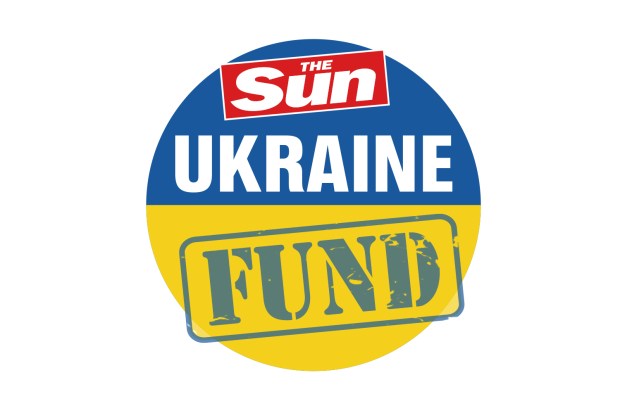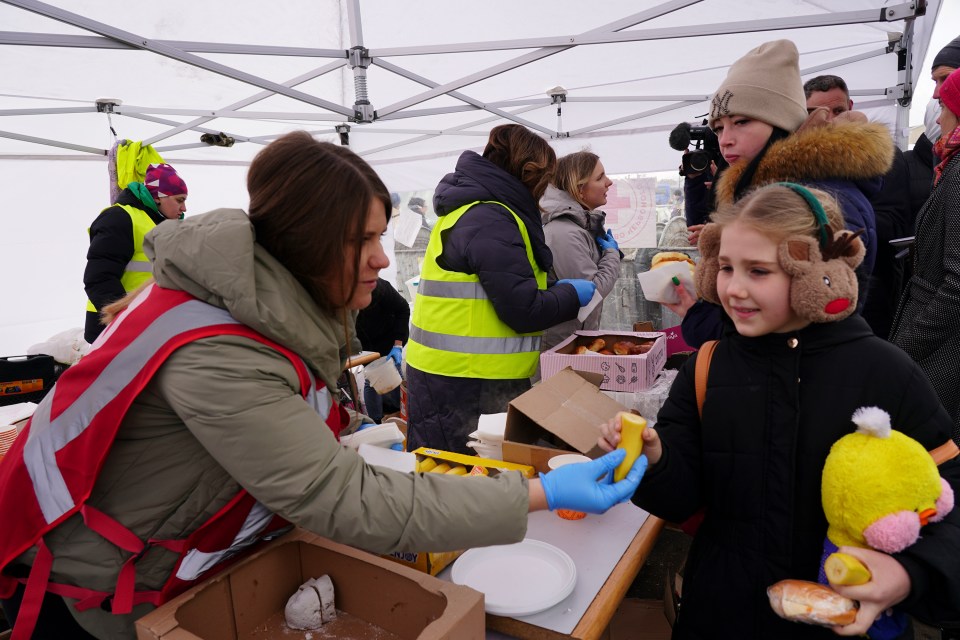WHEN the train-load of mothers and children pulled in from ravaged Kharkiv, human kindness was there to greet them.
As they shuffled from Lviv Station, exhausted, hungry kids were met by Red Cross volunteer Anna Bilas with cartons of milk and warm words.
It was perhaps the first time these youngsters had smiled since being forced from their homes.
At last in this western Ukraine city, as yet untouched by war, they had found some safety.
A clothes designer in peace time, Anna, 25, placed a carton into the outstretched hand of five-year-old Kristina Borisenko, to her delight.
Her gran Helena, 45, told me: “We only arrived 15 minutes ago. It’s good to see Kristina and her sister Olga smiling, so thank you Red Cross.
“They were very afraid in Kharkiv. They heard the bombs and thought the roof of our house would fall on their heads.”
Further down the snaking queue of displaced humanity is four-year-old Elisa Cherepovska who slurps on her milk and tells Anna: “It’s good”.
Elisa’s family is also from — Ukraine’s second city — which has borne much of the conflict.
Home to 1.4million people, its streets have been turned to rubble sending thousands fleeing westwards amid the bloodshed.
Most read in News
Many in this bitterly-cold square in Lviv, including Elisa’s family, are heading for sanctuary in Poland some 50 miles distant.
While they await shuttle buses to the border, the Red Cross, backed by money from The Sun’s Ukraine Appeal, offer some solace.
🔵 Read our Russia - Ukraine live blog for the very latest updates
Anna said: “These people really need our help. We give them something hot to eat and a place to shelter, then get them on the buses.
“I thank The Sun’s readers for donating to the Red Cross. They are really helping refugees.”
Another who fled Kharkiv, tearful Jeanne Chupis, summed up what it felt like to become a refugee, telling me earlier: “I don’t want this s***”.
A marketing executive with her own apartment in the city, she’s now one of an estimated four million looking to escape chaos in Ukraine.
Telling how her family had fled Kharkiv by train last week, Jeanne, 34, said: “When we got to the station big bombs were going off nearby.#
'CHILDREN WERE SCREAMING'
“Children were screaming and women were crying. People waved goodbye to the men who stayed behind to fight.
“Many of those fleeing had brought their cats and dogs but there was no space on the train so they had to let them run off.”
At Kyiv, the carriages were plunged into darkness to avoid shell fire.
She recalled: “It was pitch black. We heard a bomb had been dropped at Kyiv Station. We were terrified.”
Now, like many others streaming into refugee hub Lviv with little but their passports and a hastily packed rucksack, Jeanne may never return to shattered Kharkiv.
The Red Cross team at the station provide basic human needs — and some dignity — for these innocents.
Medical student Olesia Barchyshyn, 22, helping in the charity’s storage tent, said: “Many only have food and clothes which will last a short time.
“We can give them a place to sleep, hot food, nappies and milk for the children, basic medicine and stuff for hygiene like shower gel.
“I help them get to the buses which will take them to a safe place in Poland or the Czech Republic.”
In decent English — honed while staying with her brother in Orpington, Kent, last year — she told me: “I thank all the people who donated but we still need funds for food, clothes and medicine right now.”
'WE STILL NEED FUNDS'
The United Nations says more than two million people have fled Ukraine since Russia invaded
Poland has taken in 1,204,000 refugees, many passing through rail terminus Lviv.
The UN high commissioner for refugees describes the tragedy as the fastest-growing refugee crisis in Europe since World War Two.
Walking from Lviv’s chaotic and packed train strain, Lada Lubchenko, six, clutching her teddy Barney tightly, is met by the Red Cross.
Sipping a tea in the chill wind, mum Natalya, 38, from Cherkasy, central Ukraine, said: “It was so nice to find a warm drink waiting.
“We didn’t have time to eat when we fled but the Red Cross has given us free sandwiches and cake. We’re leaving everything behind and going to Estonia.”
In her reindeer ear muffs and clutching favourite teddy Mimi, eight-year-old Roxolana Scherbinska receives Red Cross cake and fruit after a harrowing journey from Kyiv.
Her mum, Olga, 32, looks shattered and close to tears having left husband football coach Slava, 21, in the capital to fight.
The lawyer said: “We saw rockets in the skies and left Kyiv. We arrived today. Roxolana was OK on the train but smaller children were crying.
“People brought their dogs and cats with them, even their parrots.”
'MANY HUNGRY PEOPLE'
Red Cross volunteer Irina Morozova, 24, makes sure the pair get a decent feed and some kind words.
A dentist, from Vinnytsia, central Ukraine, she revealed: “My father and mother have become refugees too, that’s why I volunteered.
“There are many hungry people who came from across Ukraine. First they need to drink water, then we try to feed everyone.
“Many more people are coming so we need to keep funds coming so we can help children like Roxolana.”
Meanwhile, at a train station in the Polish city of Przemsyl, just eight miles from the border with Ukraine, Red Cross volunteers greet arriving children with the essentials they need — and a cuddly toy.
Their faces beam with happiness, and for a brief moment at least, the surprise gift distracts them from the chaos they have escaped. The children have flooded here from all over Ukraine.
Norwegian Annette Selmer-Andresen, 47, is a member of the Red Cross rapid response team. Her face is drawn by the tragedy unfolding hour by hour.
She told me: “The children were just so happy to receive a teddy. The teddies we give them are essential. It’s very difficult for them to see their parents so distressed. Their father is gone and their mother is crying.
“It’s a very traumatic situation for a child. We’ve set up kids’ corners in some of the reception centres so that they can be children.
“You can’t imagine what they’re going through and what they’ll end up going through in the day and weeks ahead.”
At a nearby retail park turned refugee camp, thousands of people are arriving.
'WHEN WILL IT STOP?'
They are mostly women and children, torn from husbands and fathers who have stayed to fight. At a re-purposed Tesco superstore in the city, refugees pour in.
Annette said: “The Tesco store inside is empty and has been filled with row upon row of camp beds and the kids are playing. They are children, after all. Some people are trying to rest in all that noise. They’re utterly broken.
“Others are sat with their head in their hands, in total despair. There’s chaos everywhere. The stress and trauma they run from is one thing but coming here and not knowing where to go, whether they will manage to get food, is another.
“This place looks every inch like a refugee centre but in reality it’s more of a transit hub. People get this far and just drop. Most just sleep after three days of travelling — by car, road, rail, whatever means they can.
“They’re safe here, but this is by no means the end of their journey. You see coaches all the time picking people up, from all over Europe. There’s this huge loudspeaker and all night it announces the next coach departure.
“This morning at 2am they yelled: ‘10 people, leaving for Denmark’. It’s like this 24 hours a day. I couldn’t hold it in today. I saw a woman, standing alone, with a dog and she looked so lost. That could be me standing there.
“Imagine packing all you can into a suitcase, a bag, rucksack in half an hour and running for your lives.”
At a reception centre in nearby Medyka there are camp beds for 270 people. Currently 400 are crammed inside. No one is being turned away.
Annette added: “A lot of people who come here are still very worried about the people they left behind. All they want is to go home. There are people who have older parents not capable of making the trip so they’ve been left behind.
“One guy had a father in his 80s who was bedridden so they carried him on the train. They travelled for three days.”
Annette, of Oslo, has worked in Haiti, Peru and Sudan. She has seen refugee crises first-hand but says she’s never seen anything like this.
She adds: “And the weather is deteriorating. It’s freezing and temperatures are dropping to -11C.
“In a matter of days 1.7million people have lost everything. When is it going to stop?”
Read More on The Sun
She says with a heavy heart: “My feeling is this is just the beginning. And for these people, life will never be the same again.
“They’re hopeful they will get to return to their homes and don’t want to travel too far away — but no one knows when that will be.”
Help those fleeing conflict with The Sun’s Ukraine Fund

PICTURES of women and children fleeing the horror of Ukraine’s devastated towns and cities have moved Sun readers to tears.
Many of you want to help the five million caught in the chaos — and now you can, by donating to The Sun's Ukraine Fund.
Give as little as £3 or as much as you can afford and every penny will be donated to the Red Cross on the ground helping women, children, the old, the infirm and the wounded.
Donate to help The Sun's fund
Or text to 70141 from UK mobiles
£3 — text SUN£3
£5 — text SUN£5
£10 — text SUN£10
Texts cost your chosen donation amount (e.g. £5) +1 standard message (we receive 100%). For full T&Cs visit
The Ukraine Crisis Appeal will support people in areas currently affected and those potentially affected in the future by the crisis.
In the unlikely event that the British Red Cross raise more money than can be reasonably and efficiently spent, any surplus funds will be used to help them prepare for and respond to other humanitarian disasters anywhere in the world.
For more information visit












